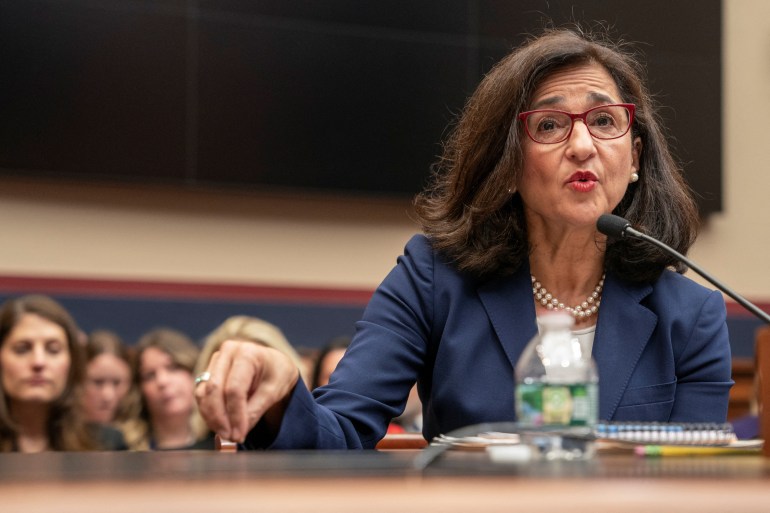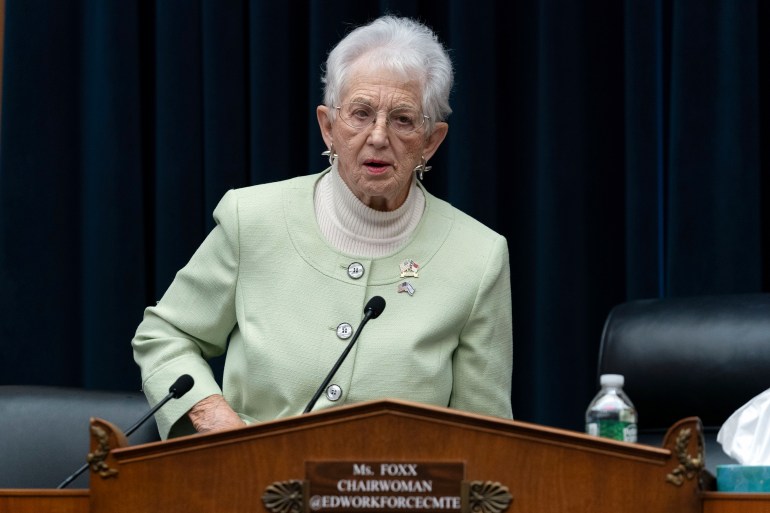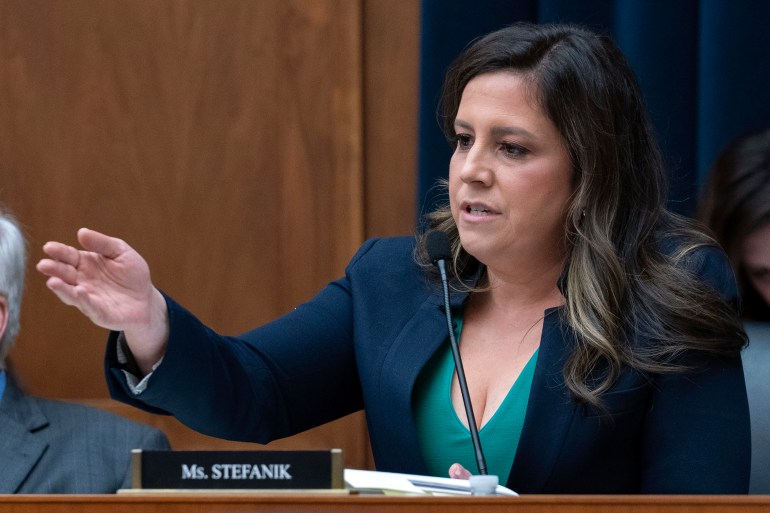Leaders from Columbia University have appeared before a committee in the United States Congress to face questions about alleged instances of anti-Semitism on campus.
The hearing was a sequel of sorts to a similar panel held in December, featuring the presidents of Harvard, the University of Pennsylvania and the Massachusetts Institute of Technology (MIT).
But on Wednesday, Columbia University President Nemat “Minouche” Shafik sought to avoid the same pitfalls that made the previous hearing go viral.
She pledged firm action to combat anti-Semitism, even engaging in discussions about specific Columbia professors and disciplinary measures during the hearing.
“We have already suspended 15 students from Columbia. We have six on disciplinary probation,” Shafik said, laying out her actions before the Committee on Education and the Workforce, part of the House of Representatives.
“These are more disciplinary actions that have been taken probably in the last decade at Columbia. And I promise you, from the messages I’m hearing from students, they are getting the message that violations of our policies will have consequences.”
Still, Republicans on the committee sought to hold Columbia University to account for what they considered failures since the start of the war in Gaza on October 7.
On that date, the Palestinian group Hamas attacked southern Israel, killing upwards of 1,000 people. In the subsequent war, Israeli attacks in Gaza killed more than 33,800 Palestinians, prompting widespread protest.
Like many college campuses, Columbia University has been a centre for student activism in the months since, with demonstrators rallying both in support of the war and against it.
But the university has drawn particular scrutiny, given its prominence as a prestigious Ivy League school and its attempts to crack down on unauthorised gatherings.
Some critics have argued that the suspension of pro-Palestinian students and groups has put a damper on free speech on campus, while others allege the administration has allowed a hostile atmosphere to thrive.

Partisan divide over campus activity
Committee chair Virginia Foxx opened Wednesday’s hearing with a statement championing the view that campus administrators have failed to create a safe learning environment for Jewish students.
She pointed to pro-Palestinian activism as evidence that Columbia and other campuses “have erupted into hotbeds of anti-Semitism and hate”.
“Columbia stands guilty of gross negligence at best — and at worst has become a platform for those supporting terrorism and violence against the Jewish people,” she said in prepared remarks.
Her statement referenced an incident on October 11 when an Israeli student was allegedly beaten with a stick while hanging posters of the captives taken by Hamas.
But at several points during the hearing, representatives took to the microphone to point out that anti-Semitism was part of a wider problem of discrimination and hate in the US.
“Anti-Semitism is not the only form of hatred rising in our schools. It’s not the only form of hatred that is impacting our children’s or students’ ability to learn,” Representative Teresa Leger Fernandez, a Democrat, said from her seat on the committee.
“Islamophobia and hate crimes against LGBTQ students have also recently spiked. They’ve led to deaths by suicide, harassment. But this committee has not held a single hearing on these issues.”
Meanwhile, Representative Ilhan Omar, a prominent progressive voice in the House, sought to dispel any conflation of antiwar protests with anti-Jewish hate.
“Have you seen a protest saying, ‘We are against Jewish people’?” Omar asked Columbia President Shafik, who answered, “No.”
Omar continued by highlighting the case of pro-Palestinian students being sprayed with a foul-smelling chemical at Columbia and being “harassed and intimidated” in other instances.
“There has been a recent attack on the democratic rights of students across the country,” she said.

Controversy looms over hearing
Shafik sought to walk a fine line during the hearing, pledging swift and decisive action against anti-Semitism while underscoring her campus’s commitment to free speech.
She was joined by Claire Shipman and David Greenwald, from Columbia’s board of trustees, as well as David Schizer, a member of the campus task force against anti-Semitism.
But looming over the proceedings was the spectre of December’s hearing, which led to the resignations of two university presidents.
On December 5, Claudine Gay of Harvard, Liz Magill of the University of Pennsylvania and Sally Kornbluth of MIT faced the same committee for questions about anti-Semitism on their campuses.
During the meeting, Republican Representative Elise Stefanik pressed the university presidents to explain — with simple, yes-or-no answers — whether “calling for the genocide of Jews” would violate their campus codes of conduct.
In each case, the university presidents sought to differentiate between protected speech and harassment, leading to convoluted answers.
“If the speech turns into conduct, it can be harassment, yes,” Magill said. She later added: “It is a context-dependent decision, Congresswoman.”
Clips of the hearing went viral shortly thereafter, with politicians on both sides of the aisle slamming the university presidents for failing to make a forceful denunciation of anti-Semitism and genocide.
Magill resigned four days after the hearing, as the public outrage grew. Gay — Harvard’s first Black president — also stepped down in January, facing pressure not only over the hearing but also over questions of plagiarism.
Those events cast a shadow over Wednesday’s panel, and several representatives made direct references to them.
Republican Representative Aaron Bean, for instance, applauded Columbia’s administrators for giving more forthright answers than their counterparts at Harvard and the University of Pennsylvania.
“Y’all have done something that they weren’t able to do: You’ve been able to condemn anti-Semitism without using the phrase, ‘It depends on the context,’” he said.
“But the problem is: Action on campus doesn’t match your rhetoric today.”
A standard approach to hate
On Wednesday, Shafik and the Columbia administrators were also pressed over many of the same issues as their colleagues from Harvard, MIT and the University of Pennsylvania.
Republicans on the committee asked them to weigh in on chants like, “From the river to the sea, Palestine will be free”. While some consider the chant anti-Semitic, others see it simply as a call for Palestinian statehood.
“I have received letters from our Jewish faculty who say they also don’t think it is anti-Semitic,” Shafik said at one point during the hearing.
But she also explained that she personally felt that language was “incredibly hurtful”.
One recommendation she said the campus was considering would create specific spaces for that kind of protest.
“If you are going to chant, it should only be in a certain place, so people who don’t want to hear it are protected from having to hear it,” Shafik said, relaying the idea.
Schizer, meanwhile, indicated that he advocated for a standard approach to hate and harassment, no matter who was being targeted.
“I’m a conservative. I’m close to many conservative students. There have been times they’ve gotten the signal that they should really go slow on a particular event or not articulate a particular position because it makes others feel uncomfortable,” Schizer said.
“And it’s striking how that kind of language has not been applied to Jewish students. When Jewish students have said, ‘We feel uncomfortable,’ the emphasis has been: ‘No, no, no, free speech.’”
“Now I want to be clear: I think free speech is essential, but I also think consistency is essential. We need to have the same approach for everyone.”

Professors under fire
Some of the fiercest criticism, however, ultimately fell to Columbia professors who were not present at the hearing.
Committee members cited statements from professors like Joseph Massad, Mohamed Abdou and Katherine Franke as evidence of bias and discrimination among the Columbia faculty.
“We have 4,700 faculty at Columbia, most of whom spend all of their time dedicated to teaching their students,” Shafik said at one point, as she defended her hiring practices.
“I have five cases at the moment who have either been taken out of the classroom or dismissed.”
In the case of Abdou, a visiting professor, Stefanik confronted Shafik with a post he wrote on social media on October 11, saying he was “with Hamas”.
“He will never work at Columbia again,” Shafik responded. “He has been terminated. And not just terminated, but his files will show that he will never work at Columbia again.”
Massad, meanwhile, came under fire for an article he wrote in the publication Electronic Antifada, describing the October 7 attack as an act of “innovative Palestinian resistance”.
“Mr Massad is under investigation,” Shafik said, adding that she believed the professor had been removed from a leadership role within the university.
Read More: World News | Entertainment News | Celeb News
Aljazera










